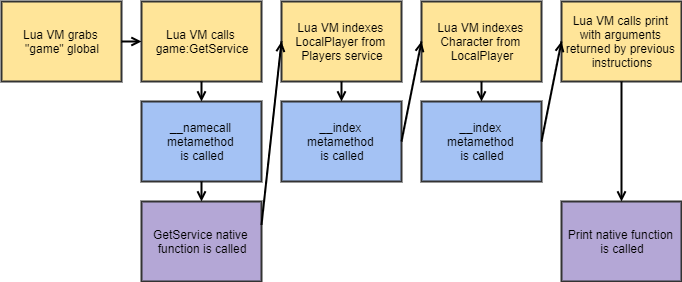Objects and Metatables
When you create an instance with Instance.new, internally it creates an 'Object'. Every instance in the game is an object - game, workspace, game:GetService("ReplicatedStorage"), or any other instance is an object. There is a cool thing with all of these objects though - they all have the same metatable.
You may be asking - what is a metatable? Fear not, as we will now be diving deep into how metatables work and why they are so important for development with Synapse X.
Metatables
Metatables serve an extremely important purpose in both Lua and Synapse X - they allow for logic to be put behind regular tables, allowing for powerful programming constructs that are extensively used throughout the game engine.
But for Synapse X, they allow something even more powerful - lets look at an example script and explain the process of how it executes:
print(game:GetService("Players").LocalPlayer.Character)

We will take a particular look at the blocks highlighted in blue - those are metamethod calls, and Synapse X has a special feature for metamethod calls - we can hook them.
Metamethod Hooking
Metamethods are a particular feature of metatables which allow Lua functions to be called when someone tries to do certain operations with our metatable. We will be using that fact to replace the function used for the object metatable.
Simple metamethod hook
The following script is the base script used for metamethod hooking on Synapse X. We will explain this script line by line.
local OldIndex = nil
local OldNameCall = nil
OldIndex = hookmetamethod(game, "__index", newcclosure(function(...)
local Self, Key = ...
return OldIndex(...)
end))
OldNameCall = hookmetamethod(game, "__namecall", newcclosure(function(...)
local Self = ...
local NamecallMethod = getnamecallmethod()
return OldNameCall(...)
end))
local OldIndex = nil
local OldNameCall = nil
This declares the original functions we will call later.
OldIndex = hookmetamethod(game, "__index", newcclosure(function(...)
local Self, Key = ...
return OldIndex(...)
end))
This has three parts - the hookmetamethod call, the newcclosure call, and the actual hook itself. This hooks the __index metamethod, which is called whenever someone indexes a object. (game.Workspace for example)
Its also really important to declare these functions as vararg and pass their arguments as such, or detection methods can arise.
OldNameCall = hookmetamethod(game, "__namecall", newcclosure(function(...)
local Self = ...
local NamecallMethod = getnamecallmethod()
return OldNameCall(...)
end))
This is the same as the above hook, but will replace __namecall, which is used for calls with self. (game:GetService("Workspace") for example)
The getnamecallmethod call is needed so we can get the function name which we will use later in this tutorial. (in the above case, NamecallMethod would be GetService)
We will now be taking a detour to explain how newcclosure works, which is important to understand for later parts of this tutorial.